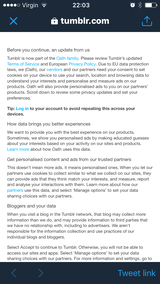New side project: I am working on a microblogging app called Ooble. The aim is to be able to replace my use of Tumblr for linking to web pages I find interesting and making short notes.
Motivation
The GDPR has made what was already a grim situation with regard to advertising-backed social-network sites even grimmer.

I can’t read a comic on Hive or a blog hosted on Tumblr without a multi-page form trying to browbeat me in to consenting to their misuse of tracking data. I don’t like it, and I don’t like that by hosting my link blog on Tumblr I am subjecting my readers (I like to pretend they exist) to the same abuse.
The recent Tumblr announcement that images designated by their easily confused machine-learning algorithms as adult content will be banned is a reminder of how much power over our expression we have allowed these gatekeepers to assume. You should not need to be a porn freak to be chary of granting American companies sole discretion over what is decent or indecent in the UK or wherever else we live.
With some effort I can instead host my links and likes on my own site, pdc.ooble.uk. Without advertising there is no need for tracking or secret cookies and I am free to write what I like (with the responsibility that entails, of course).
What Ooble Is
What you see on pdc.ooble.uk is series of notes: short (single-paragraph or less) jottings that will often link to something interesting I have found online. Where possible the links will be illustrated with a thumbnail from the page and summary text.
They are presented in (reverse) chronological order. There is a modicum of organisation, in that you can filter notes by tag.
There is also an Atom feed for antediluvian feed-reader fans and IFTTT.
What Ooble Is Not
Ooble is not a social network: readers will not need to join Ooble to read it or follow updates. In the fullness of time you will be able to like or boost ‘syndicated’ copies of notes on your existing social networks or IndieWeb site.
The great benefit of this for me is I don’t need to expend effort supporting massive scalability in order to handle thousands of users:
-
since only the editors need accounts (which so far just means me), and
-
my entire multi-year Tumblr archive fits in a few GB, meaning it is OK to just use ordinary files instead of some exotic hosted storage solution.
Less time faffing with infrastructure means more time to spend making something fun.
What Ooble May Become
Webmention support is probably next on my list; this should allow me to plug in to the IndieWeb social meta-network. Ooble should then be able to syndicate notes to Twitter, Mastodon and my old Tumblr blog, so that someone who does want to follow me can without needing a feed reader.
Other things to look in to:
-
I want to explore making the page layout more interesting and give more emphasis to must-read links over things merely noted to be read later.
-
The internet is awash with unattributed photographs and other work: How can Ooble make it easier to include better attribution and sourcing in link pages?
-
Mastodon makes a feature of hiding posts or images behind content warnings, which I should try to mix in to Ooble somehow.
What Ooble Means
Turns out ooble is a word for rolling about on the floor out of boredom.